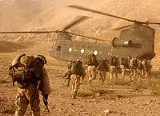
and the United Kingdom
with the support of other North Atlantic Treaty Organisation (NATO) as well as non-NATO countries. Originally, the campaign was waged against al-Qaeda
and other militant organizations with the purpose of eliminating them.
The phrase 'War on Terror' was first used by US President George W. Bush
and other high-ranking US officials to denote a global military, political, legal and ideological struggle against organizations designated as terrorist and regimes that were accused of having a connection to them or providing them with support or were perceived, or presented as posing a threat to the US and its allies in general.
I Define a “terrorist” as a non-state actor who attacks civilian targets in order to strike terror into the hearts of the enemy community.. A “state terrorist” is a state doing the same thing.![]()
"I think they very much see the world in a black and white way, us against them, Muslims against infidels."![]()
You know, terror is an idea. You don’t fight an idea with a conventional Army. To win a war on terror you have to win the hearts and minds of people from whom, from where the terrorists are operating from. If you win their hearts and mind and get them on your side, you’ll win the war. If those people start regarding the terrorists as freedom fighters, history has told us that you can’t win the war.![]()
I’ll give you an example of (George Bush's) war on terror. He’s spent something like almost a trillion dollars. The estimates are that anything up to a million people have died and has he made the world a safer place? In my opinion he’s made the world a far more dangerous place. These are now nurseries for future terrorists.![]()
There are some Arabs who think that the Germans did the right thing by the Jews. This makes it easy to recruit Arab terrorist. ![]()

